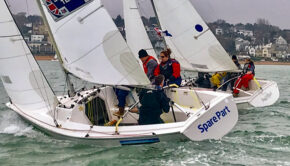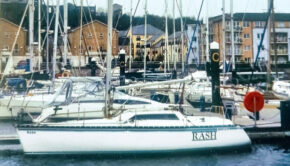Overboard: Stories from off the boat
Published on August 1st, 2019
Falling overboard can occur unexpectedly and end tragically. Staying onboard is always a priority, but even the most experienced can find themselves off the boat. Keith Taylor shares his experience.
MOB events conspire to strike when least you expect. My wife Karen and I each went for unscheduled dips in the Sixties while living aboard our big old English gaff yawl at Essex Boat Works on the Connecticut River. To risk our lives, we didn’t even have to leave the dock.
Returning to our floating home in the wee hours of a frigid mid-March Sunday morning after a convivial dinner with sailing friends, Karen skipped merrily onto to our wide, substantial, but rail-less gang plank, only to skate on its black ice coating.
A flailing half-gainer dumped her between boat and dock, mercifully without hitting and hurting herself. Suddenly she was screaming for help, fueled less by fear than the paralyzing icy cold water. Lingering slabs of winter ice were still drifting downstream. We were alone in a silent, desolate, unlit boatyard.
I grabbed a length of line, clapped it around the nearest stanchion, got it under her shoulders and began lashing her to the rail. My mind raced. There was no earthly way I could simply pull Karen aboard, even minus the heavy wool coat and long boots that were dragging her down.
The mast was still stepped, halyards tied off. I could free the four-part gaff throat halyard, rig a sling and haul her up and over the rail like a sack of spuds. I could run into the darkened yard buildings and fumble around for a ladder that would reach the shallow bottom, give her a toehold and a step out, if she was still capable. I could temporarily abandon her, trussed up and alone, and run a couple of hundred yards to the nearest darkened house yelling all the while for help.
A voice pierced the blackness of the night where there should have been none. It came from the end of a neighboring dock that was empty when we left for dinner. A tough, leathery old skipper who’d paused his offshore delivery of a big powerboat from Florida to Maine was down in his engine room at that ungodly hour when he heard our shouting.
Bare minutes later Karen was aboard, dry and warming up in her bunk while her savior and I set to work on the rum jar. “That cold water can kill,” I said. “Tell me,” was his rejoinder. “I lost three ships under me on the Murmansk run.” To my everlasting regret, I never even got his name.
My watery incursion flipped the scenario from near tragedy to slapstick comedy.
Essex Boat Works familiars know too well about the effects of the tides in the narrow gut between EBW and Essex Island. The docks are perpendicular to the tidal stream and miscalculating the current effect can produce dire results for the inept and unwary, plus endless entertainment for the cognoscenti, and not to mention some work for the yard’s painters.
For us, with our big boat’s minuscule 15-hp Volvo Penta engine courtesy of a previous penurious owner, getting unscathed into our berth was always a fraught undertaking.
Returning from a summer Block Island cruise at max tidal flow, I deployed my crew with bow and stern lines. With the specter of the steel bulkhead at the head of the dock I assigned springs for added braking to the strongest and most adept individuals. Then, I slammed the throttle full ahead, my aiming point the gap in the docks one space upstream of our regular berth.
It was pure poetry. We described a sweeping arc, pushed by current down into our berth, before going full speed astern as the boat eased out of the tide. The boat came to a halt, dead center in the dock, mooring lines secure. The crew turned to cheer me. I took a little bow and leaned back against the lifelines – which promptly let go, pitching me in the drink!
——————–
Scuttlebutt wants to feature your overboard experience. Send to editor@sailingscuttlebutt.com.









 We’ll keep your information safe.
We’ll keep your information safe.